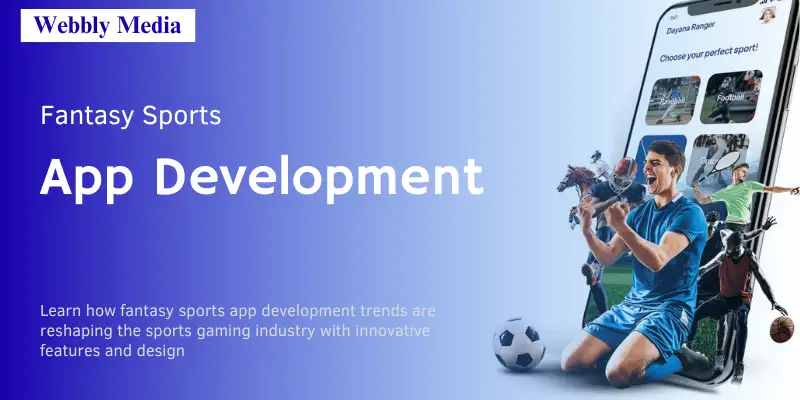Over the past several years, the development of fantasy sports apps has rapidly transformed the digital gaming and sports industry into one of the most quickly evolving sectors in mobile app innovation. People worldwide are utilizing fantasy sports apps to manage fantasy teams, compete with friends, and engage with real-life sporting events in unprecedented ways.
Here at Webbly Media, we specialize in highlighting how businesses, startups, and entrepreneurs are exploring the impact of fantasy sports app development and the latest trends they can incorporate into their strategies to prepare for the future. Technologies such as AI and blockchain, along with a focus on UX design, are driving significant growth in the realm of fantasy sports.
In this comprehensive blog post, we will take a deeper dive into examining the trends in fantasy sports app development that are reshaping the industry. We will explore the technologies driving these changes, market opportunities, strategies for revenue generation in this sector, as well as the challenges involved. Whether you are an entrepreneur looking to develop your own fantasy sports app or simply staying informed about the latest developments in this expanding industry, this piece has got you covered.
Fantasy Sports Apps Elevate to New Heights
The popularity of fantasy sports apps has skyrocketed globally, driven by the widespread adoption of smartphones, enhanced internet connectivity, and a growing passion for sports worldwide. Predictions suggest that the fantasy sports industry will soar to $78 billion by 2030, showing a remarkable compound annual growth rate of over 13%.
These apps excel by combining sports enthusiasm with digital innovation, offering users the ability to:
-
Create their fantasy teams using real-life players.
-
Earn points based on the actual performance of players in live matches.
-
Compete with friends or participate in leagues.
-
Have the chance to win prizes, recognition, and occasionally, some cash rewards.
Given the high engagement levels, it’s not surprising that businesses are eagerly embracing fantasy sports app development trends to captivate the hearts of sports aficionados.
Why Are Fantasy Sports Apps Booming?
The sudden popularity of fantasy sports apps can be attributed to several key factors:
-
Global Sports Fanbase: Popular sports like football, cricket, basketball, and baseball enjoy a massive following worldwide, and fantasy apps provide fans with a digital experience.
-
Technological Advancements: The rise of smartphones, advanced cloud computing, and AI analytics has enabled fantasy sports platforms to offer real-time data, more accurate predictions, and enhanced user experiences.
-
Revenue Opportunities: Fantasy apps generate income through advertisements, subscriptions, in-app purchases, and premium features, making them a profitable venture.
-
Regulatory Backing in Certain Regions: Legalization of some forms of fantasy sports in countries like the US and India has given the industry credibility and built consumer trust.
Emerging Trends Shaping the Future of Fantasy Sports App Development Beyond 2025
Diving into the evolving landscape of fantasy sports app development, businesses and developers are advised to closely monitor the following trends:
-
Integration of AI and Machine Learning
Utilizing AI technology to analyze player statistics, forecast outcomes, and provide recommendations to users is now common. Machine learning algorithms empower users to craft superior teams, enhancing the competitiveness of the platform.
-
Adoption of Blockchain and Cryptocurrency
By leveraging blockchain technology, fans can trust the fantasy games they engage in. Furthermore, integrating cryptocurrency payments enables apps to cater to a global customer base, ensuring secure transactions. Non-fungible tokens (NFTs) are also being explored as a means to grant users ownership of unique digital items.
-
AR and VR Experiences
The gamification of Fantasy Sports through AR/VR technology is becoming increasingly popular. Offering immersive experiences, users can view live matches in virtual reality and manage teams using engaging gaming visuals.
-
Intersection of Esports and Fantasy Sports
The convergence of esports and fantasy sports presents new opportunities. Fantasy Esports has emerged, attracting a diverse demographic of users to fantasy platforms, expanding their reach.
-
Hyper-Personalization
Harnessing data-driven insights, fantasy apps now provide personalized recommendations, tailored rewards, and unique gaming experiences to individual users.
-
Implementation of Gamification Features
Features such as leaderboards, achievement badges, quizzes, and in-app challenges are making fantasy sports more engaging and interactive.
-
Cross-Platform Accessibility
With the adoption of frameworks like Flutter and React Native, web applications on iOS and Android devices now mirror the performance of native apps.
-
Voice Assistant Integration
Capitalizing on AI-enabled voice assistants like Alexa and Google Assistant, fantasy sports apps are incorporating voice commands for accessing team news, live match statistics, and enhancing user interactions.
-
5G-Powered Performance
The integration of 5G technology is set to revolutionize the fantasy sports experience by delivering ultra-fast connections in real-time, enhancing user engagement.
-
Emphasis on Responsible Gaming
Amid growing addiction concerns, operators are prioritizing responsible gaming measures such as self-exclusion tools, deposit limits, and reminders to promote safe and healthy user participation.
Advantages of Aligning with Fantasy Sports App Development Trends
Businesses that follow the latest trends in fantasy sports app development enjoy the following advantages:
-
Competitive Edge – Early adopters gain a competitive advantage in the market.
-
User Engagement – Interactive features enhance player retention on your platform.
-
Revenue Growth – Various monetization models expand revenues through added options and functionalities.
-
Brand Trust – Achieving success enhances trust and loyalty among users.
-
Scalability – Technology-driven solutions give assurance that apps can seamlessly expand to meet user demands.
At Webbly Media, we empower organizations to capitalize on these trends and create cutting-edge apps that captivate users and boost profits.
Challenges in Fantasy Sports App Development
Despite the potential opportunities, businesses face various hurdles in this sector:
-
Legal and Regulatory Concerns – Fantasy sports apps may not be permissible in all regions.
-
Intense Competition – The market is dominated by major players like Dream11, DraftKings, and FanDuel.
-
Security Risks – Safeguarding sensitive data and financial transactions is paramount.
-
High Development Costs – Implementing advanced features such as blockchain and AR/VR necessitates substantial investments.
-
User Acquisition – Innovative strategies are required to stand out in a crowded market.
Monetization Strategies for Fantasy Sports Apps
To achieve success in the competitive world of fantasy sports apps, monetization is essential. Here are some effective approaches:
-
Freemium Model: Offering the app for free with the option to purchase additional features.
-
Subscription Models: Users pay periodic fees for access to premium features.
-
Advertising: Including in-app advertisements and forming partnerships with brands.
-
Entry Fees: Users pay to participate in contests, generating revenue for the app.
-
Sponsorship Deals: Collaborating with sports leagues and teams to boost monetization.
Combining these strategies with the latest trends in fantasy sports app development can maximize returns.
Essential Features in Fantasy Sports Apps
Today’s fantasy sports enthusiasts have high expectations. Key features that should be included in apps are:
-
Real-time match data
-
Secure payment gateways
-
User-friendly interface
-
Social media sharing capabilities
-
Support for multiple sports
-
Advanced analytics and insights
Incorporating these features enables businesses to create apps that cater to the evolving demands of sports fans.
Pros & Cons of Fantasy Sports App Development
| Pros | Cons |
|---|---|
| High revenue potential from multiple monetization streams | High development and maintenance costs |
| Rapidly growing global user base | Regulatory challenges in some countries |
| Advanced technologies (AI, Blockchain, AR/VR) increase engagement | Risk of addiction among users |
| Strong brand-building opportunities | Heavy competition from established platforms |
| Expands fan engagement beyond live matches | Security concerns with sensitive data |
Closing Remarks
The rising popularity of fantasy sports is driving the need for companies looking to enter the space to monitor emerging trends in fantasy sports app development. Webbly Media, a group of experts, assists businesses in integrating cutting-edge technologies like AI, blockchain, gamification, and other latest advancements to develop engaging apps that excite users and enhance profitability.
The outlook for the future of fantasy sports is promising, and those who embrace these innovations early on will reap the benefits.







